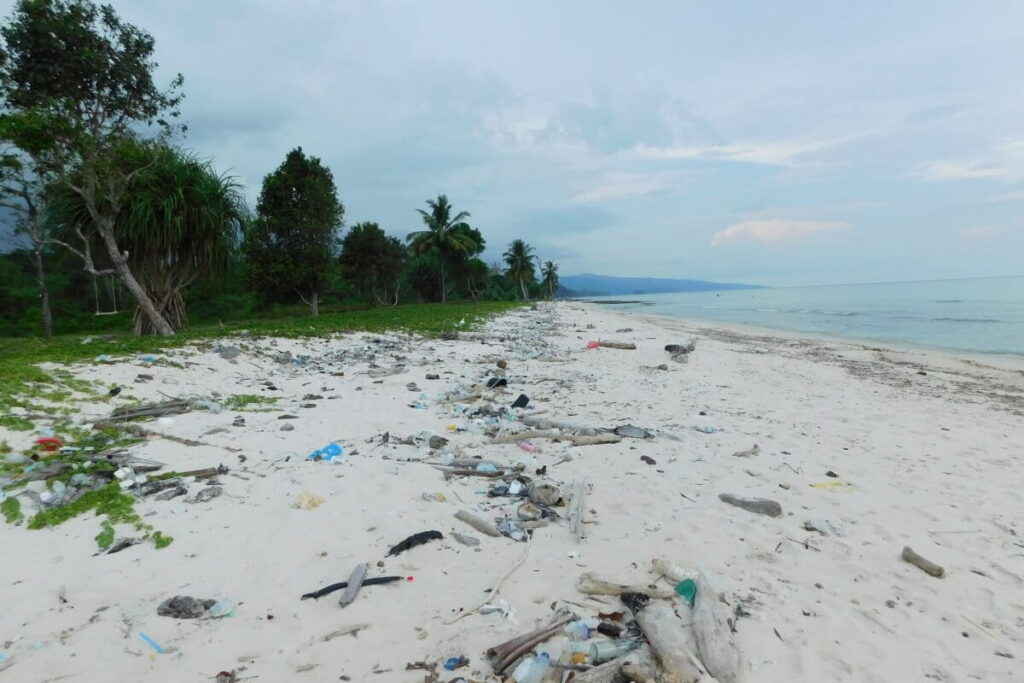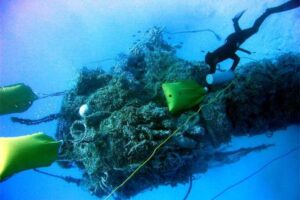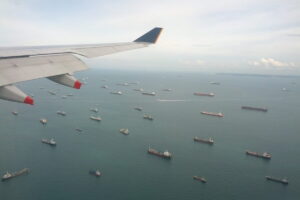This Is Why India Needs A Marine Litter Policy
Sep 22, 2025 | Pratirodh Bureau
Marine debris is strewn over the beaches at Great Nicobar island. Plastic waste is choking coral reefs in the Andaman and Nicobar Islands, according to a new marine survey (Image by Rama Narayanan)
- Plastic debris and derelict fishing gear are disturbing corals reefs in the Andaman and Nicobar Island, found a survey.
- Plastic formed more than half of the marine debris in the reefs surveyed.
- Similar reports had emerged from reefs in the Gulf of Mannar.
Plastic debris and derelict fishing gear are “entangling” and “smothering” corals reefs in the Andaman and Nicobar Islands that are home to some of India’s most pristine coral reefs and with endemic fauna and flora, a new marine survey shows.
The survey aimed to provide critical data on the impacts of marine litter and derelict fishing gear on the critically endangered coral reefs in the Andaman and Nicobar Islands, an archipelago in the Bay of Bengal, recognised as highly biodiverse yet underrepresented in global marine pollution studies. The findings add to recent studies highlighting an increasing amount of plastic litter and derelict fishing gear in global oceans, which pose significant threats to corals and reef-associated marine biota.
The survey, published in the Marine Pollution Bulletin, was conducted by the Mahatma Gandhi Government College in Andaman and Nicobar Islands; regional centres under the Indira Gandhi National Open University (IGNOU) in Port Blair and Thiruvanathapuram; the Council of Scientific and Industrial Research’s National Institute of Oceanography, Goa; and Academy of Scientific and Innovative Research, Ghaziabad.
Plastic was the most dominant litter, forming about 60% of the litter in the reefs, the survey found. Derelict fishing gear made mostly of plastic comprised about one-third of the total litter.
Indicators such as the plastic abundance index (PAI), hazardous item index (HII), and clean environment index (CEI) to assess the ecological impact of marine litter highlighted “significant risks” posed by marine litter to the reefs.
The scientists report that their findings help “strengthen the assessment of marine litter in remote islands and underscores the urgent need for improved waste management, stricter regulations on the disposal of fishing gear, and effective removal of derelict fishing gear from the coral reef environments.” The study also offers actionable insights for policymakers and stakeholders on priority interventions needed for managing marine litter to safeguard vulnerable coral reef systems, they say.
The new report provides data on the intensity of marine debris contamination in some selected reef areas in the Andaman and Nicobar Islands, says Patterson Edward, director of Chennai-based Suganthi Devadason Marine Research Institute (SDMRI). “Since this is the first report from the Andamans, it is regionally important and serves as baseline.”
India’s reefs under pressure
India has an estimated area of 2,375 sq km of coral reefs, lead author Venkatesan Shiva Shankar, scientist from Mahatma Gandhi Government College, Andaman and Nicobar Islands, told Mongabay India. There are no comprehensive studies on the quantum of litter in coral reefs or their damage by derelict fishing “because the quantification demands mammoth funding, huge manpower, and is a Herculean task.”

Ecosystem-based debris assessments, especially those focusing on critical and sensitive habitats like coral reefs and mangroves, are crucial due to the extensive ecosystem services they provide and the dependent stakeholders in the form of tourism in sites like Andaman and Nicobar, says Kiruba Sankar, senior scientist (fish and fishery sciences) at the Indian Council of Agricultural Research (ICAR) Central Island Agricultural Research, Port Blair.
Research on litter accumulation and its impact on coral reefs remains limited, making it difficult to ascertain the extent of contamination and the most vulnerable reef systems, he says. “This is particularly concerning given the increasing frequency of extreme events like coral bleaching, such as those witnessed in the Andaman and Nicobar Islands, which can exacerbate the detrimental effects of plastic debris on coral health.”
The nature and extent of damage to reefs varies. For example, Acropora species was the most affected by damage by fishing gear. Litter is one of the stressors, adding to others such as climate change, global warming, coral bleaching, disease, says Shiva Shankar.
“During the field survey, I found that the coral reefs are resilient — they encrust over the litter and stabilise themselves,” he says. There is ample literature on how plastic is used as substrate by the corals, he adds.
Edward however, says that “predominantly the damage is permanent.” Only, sometimes, the fragmented coral colonies may grow as separate colonies making the damage temporary, he says.
Kiruba Sankar agrees. “The potential for permanent damage is high due to the infrequent nature of underwater debris removal compared to beach clean-up initiatives,” he says.
Gulf of Mannar reefs too under peril
SDMRI estimated damage in a 1,152-square-metres area affected by marine litter in the Gulf of Mannar, which encompasses 21 islands, with the major reefs being distributed around them.
About 43% of the marine debris in the Gulf of Mannar is derelict nets, finds this 2023 study. The new Andaman and Nicobar study too finds derelict nets made of plastics account for a significant amount, almost 34%, of the marine debris, says Edward.
The study in the Gulf of Mannar also found that 47.56% of the corals that were in contact with marine debris were fragmented and 34% had tissue loss. “To make a fair comparison, all reefs in India must be assessed throughout in detail, and not just in selected areas, using the same protocols,” he adds. Also, in addition to macroplastics, microplastics should also be quantified or estimated in the reefs.
Early pointers
Kiruba Sankar and colleagues published a study in Regional Studies in Marine Science in 2023, the first record of systematic quantification and classification of marine debris from the small, remote Car Nicobar. With little baseline information on marine debris, a team of scientists surveyed 10 beaches in Car Nicobar to study the prevalence of marine debris.

The survey by scientists from Indian Council of Agricultural Research institutes — the Central Island Agricultural Research Institute in Port Blair, and Central Inland Fisheries Research Institute, Vadodara — in collaboration with the MGR Fisheries College and Research Institute in Nagapattinam, recorded 1438 debris items, of which plastic debris was found dominant (83.72%). Among the plastics, fishing nets and ropes were found to be dominant, accounting for 38.87% of the plastics found, followed by plastic bags, plastic bottles, polypropylene woven bags, plastic cans, floaters, and plastic cups.
Land-based debris items from recreational and shoreline activities constituted over half of the debris, followed by sea-based sources such as shipping, fishing, and dumping activities which formed about 45% of the debris.
Apart from the shore-based debris, a lot of other debris items are also dumped close to the beaches and other locations in Car Nicobar. Displacement of plastic debris could also happen from land to seaward since the region witnesses annual adverse events such as cyclones, heavy rainfall, and wind pattern, the study reports.
Plastic debris belonging to nearby countries such as Indonesia, Thailand, Malaysia, Myanmar, etc. was also recorded in the surveys. Shipping-based debris could be a probable source of foreign debris due to the proximity of the Nicobar archipelago to the Strait of Malacca, one of the busiest shipping routes in the world, the scientists say.
Litter mitigation
Strategies to mitigate litter in coral reefs should prioritise responsible tourism practices, enhanced public awareness campaigns, and implementation of underwater clean-up programmes employing trained divers, says Kiruba Sankar.
Being an island, marine tourism is one of the major drivers of Andaman and Nicobar Islands’ economy, the coral reefs and mangroves ecosystems being the attraction. “Hence, utmost priority should be given to ensure that these ecosystems are managed sustainably from anthropogenic impacts.”
As a way forward, to reduce the litter and protect the reefs, Shiva Shankar suggests sensitising the fisherfolk and the coastal communities regarding the impacts of litter over the coral reef ecosystem.
Meanwhile, Edward recommends that removal of debris from the reef areas should be carried out always by scientist divers who can carefully remove the litter without damaging the reefs, “and not by any novice recreational divers.”
He also suggests training and monetary benefits to fishers for collecting derelict nets as an incentive to avoid stagnation of nets underwater.
The report by Kiruba Sankar’s team says that the negligence of plastic waste due to anthropogenic activities is a key issue to be discussed at the policy level. Being a sea-locked island hindered by logistical constraints, waste management could be challenging in a location like Car Nicobar. Apart from the shipping debris, the local waste generated in Car Nicobar Island should be identified and disposed of properly through appropriate waste management practices, the team recommends.
The best option is to engage the local stakeholders in the waste management process, including systematic collection and recycling of plastic waste, the scientists report.
Also, the inflow of plastic-based items should also be minimised and products packed with environmentally friendly materials should be promoted, they say. “Stakeholder engagement is the key to the fight against the plastic debris menace in Car Nicobar” and the need of the hour is to generate a lot of awareness and knowledge among the public and sea-based stakeholders on the detrimental effects of plastic debris on ocean health.”
